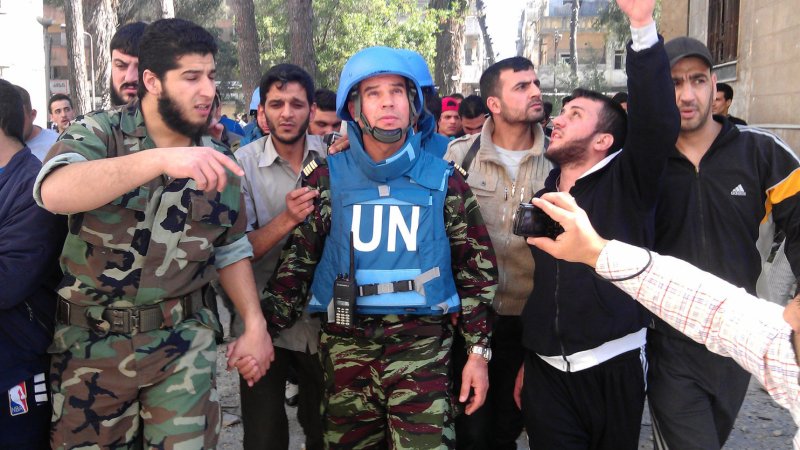Syrian Abdul Razzaq Tlas (L),leader of the opposition Katibat al-Faruq, walks with Moroccan UN observer, Colonel Ahmed Himmiche (C), during the United Nations monitors visit to the restive city of Homs, Syria on April 21, 2012. Both sides in the Syrian conflict have been reported to breach the fragile two-week ceasefire. UPI/Khaled Tallawy |
License Photo
BEIRUT, Lebanon, April 24 (UPI) -- Security sources say a senior terrorist has been killed planting a bomb in Syria, a report that, if correct, underlines the growing presence of jihadist veterans in a conflict that could become a sectarian war.
Abdel Ghani Jawhar of Fatah al-Islam, an explosives expert and longtime associate Walid Boustani, another Lebanese, were among a group of about 30 militants who allegedly sneaked into Syria several weeks ago, the sources said.
Jawhar was said to have been killed while planting a bomb.
The group from Fatah al-Islam, an offshoot of al-Qaida, wound up in the rebel-dominated town of Qsair near the rebel stronghold of Homs, 25 miles from the Lebanese border.
Lebanon is a key infiltration route into Syria for the jihadists who appear to be gathering there in some numbers.
Lebanon itself is a powder keg of fierce rivalry between the Sunni militants and the Iran- and Syria-backed Shiite Muslim Hezbollah.
If the fighting in Syria degenerates into an all-out civil war between the ruling Alawites, an offshoot of Shiite Islam, and the country's 75 percent Sunni majority, there's little doubt that Lebanon's sectarian divisions will be ignited again.
That will produce another of the religion-driven bloodbaths that have plagued the tiny country for decades, where outside powers have long manipulated Lebanese fractious sects.
Since the Feb. 14, 2005, assassination of five-time Prime Minister Rafik Hariri, Lebanon's most prominent statesman and leader of most of Lebanon's Sunnis, Shiite-Sunni enmity has flared alarmingly.
A U.N.-mandated Special Tribunal for Lebanon has indicted four members of Hezbollah, two of them senior figures, for killing Hariri and 22 other people in a massive bombing in central Beirut. Hezbollah, a key ally of Syria's President Bashar al-Assad, has denied involvement and refuses to hand over the four suspects for trial.
The episode has heightened Sunni-Shiite rivalry to an alarming degree and the spillover of violence from Syria is starting to occur.
That would draw in not just factions of Lebanon's divided Maronite Catholics, the main Christian sect, but outside powers like Shiite Iran, Hezbollah's patron, and Saudi Arabia, the Sunnis' main backer.
Indeed, there are growing signs that the Saudis, who want to see Assad toppled and Alawite power smashed forever to isolate arch-rival Iran, have been funneling jihadist fighters into Lebanon to counter Hezbollah, Iran's ally, and to join Syria's Sunni rebels.
Diplomatic intelligence sources in Lebanon say Saudi militants have moved into Lebanon in significant numbers in recent years, many of them going to ground in Islamist sanctuaries in Palestinian camps.
In one camp, Nahr al-Bared outside the northern, Sunni-dominated port city of Tripoli, Fatah al-Islam, hundreds of jihadists, including a large contingent of around 50 Saudis, fought the Lebanese army for four months before being crushed in fierce urban combat in May-September 2007.
The surviving jihadists scattered, many going to the sprawling Ain al-Hilweh camp in south Lebanon, where veterans like Jawhar held sway and started rebuilding the Islamist force.
They retaliated against the military. On Dec. 12, 2007, Maj. Gen. Francois El-Hajj, a Maronite Christian allied with Hezbollah, was assassinated in a car bombing in the Beirut suburb of Baabda.
Jawhar, who hails from the Akkar region in northern Lebanon, was implicated in that killing.
He's also accused of masterminding a string of bombings in Lebanon. They include attacks on U.N. peacekeeping forces and Lebanese troops around Tripoli, in which scores were killed or wounded.
He's wanted, too, for the attempted assassination of Col. Samir Shehadeh, commander of the intelligence branch of the Internal Security Forces, in 2006.
Until recently he was holed up with other Islamist fighters in Ain al-Hilweh, which is off-limits to Lebanese security forces. Tawfiq Taha, aka Abu Mohammed, believed to be a top al-Qaida operative, is there now.
The sources said Jawhar, one of Fatah al-Islam's leaders, was killed there Friday night as he prepared the bomb to hit Syrian troops seeking to move into Qsair.
Jawhar showed the untrained Syrian fighters how to make bombs and planted dozens himself that took a toll of Syrian forces before he was killed.
The activities of jihadists like Jawhar haven't been welcome by the Free Syrian Army, made of defectors from Assad's army. They fear jihadist involvement will antagonize the West and block hoped-for arms shipments to the rebels.





